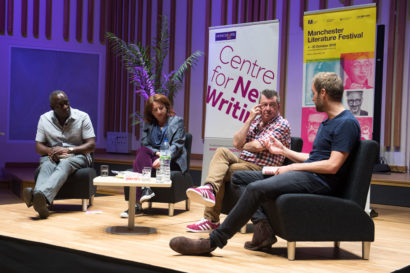 MLF Chapter & Verse
MLF Chapter & Verse
The Manchester Literature Festival Blog
Review: Common People
Centre for New Writing student Charlotte Wetton discovers new voices at Common People.
I went to the ‘Common People’ event because I crave new stories and new voices. Working-class experience in literature is a rich seam not yet tapped. If I were a publisher, I would be signing up some of these debut writers pronto.
Common People is an anthology of memoir – short pieces of a few thousand words, edited by Kit de Waal. Celebrating the success of her first novel My Name is Leon, de Waal was left with a sense of ‘where is everyone?’ and wanted to create an anthology that was ‘celebratory and unapologetically working-class’. Manchester Literature Festival had invited Lisa Blower, Stuart Maconie, Adam Sharp and Alex Wheatle to read from their pieces and discuss the book.
And there was a celebratory warmth in the extracts read: Blower’s love of factory-floor Stoke dialect gained from ‘chattering matriarchs’; and her Del Monte fruit salads with evaporated milk. Or Maconie’s council houses, whose identical room layouts were ‘handy at darkened parties’. Legendary local characters from these childhoods loom large: the kid who set fire to his pubic hair; the girl who died from chewing gum. Blower’s Nan is almost in the auditorium, stealing the show from her granddaughter with reported lines like ‘I was so beautiful, I could have been killed.’ Maconie’s enthusiastic reading, in particular, brings guffaws from the audience; not least his sarcastic trouncing of pop-song lyrics like ‘Little Boxes’ that belittle working-class lives. By contrast, Adam Sharp’s memoir of childhood abandonment and parental drug-addiction ensures there’s no saccharine gloss to the event. His recounting of his mother’s repeated, failed attempts at home abortion renders the auditorium silent. (Although his dead-pan style – both writing and reading – gives some cracking one liners.)
And this naming – whether affectionate or harrowing – is important. The naming of tinned fruit salad or ‘the backs’ in print is reclamation and conservation. Just as it’s important to name those experiences of micro-aggressions and outright discrimination: Blower’s peers at her new school were told not to speak to her or her sister ‘because they thought we were scousers’; Maconie recollects his accent being mocked when he started at the BBC ‘as if that were OK’. He also offers a more subtle example of how the NME would always print the swearwords of the Happy Mondays phonetically, as a way of ‘keeping you out, keeping you in your little box.’ This act of naming and identifying is key. Committing these characters, street names, food-stuffs to print is tantamount to putting them in a glass museum case and saying: ‘look, this thing is worth looking at’.
We have lost thousands of generations of working-class experience – through illiteracy and through cultural hierarchy. There is an urgency in curating or commissioning memoir, a no-frills form that asks for honesty. Maconie and Blower were approached by de Waal to contribute. Sharp and other unpublished authors gained a place through the public competition. Memoir conserves and shares.
There’s an obvious parallel with the women’s movement. It has taken at least fifty years of hard work for women writers to claim the validity of their experiences in literature. Fifty years of being mocked, ignored and patronised for writing about breast-feeding or sexual assault. Their arguments – that domestic space is as valid as political space, that social achievements are as great as military ones – have been made in the academy but also through the creative arts – through articulating experience and demanding empathy and legitimacy.
Let’s hope it doesn’t take Common People as long to gain validation. I’m optimistic that in our more pluralistic age, readers will have the humility and respect to listen, read, and engage with another’s experience – whether or not they share it.
So now de Waal can celebrate others’ successes as well as her own: this anthology is a communal shout of ‘we are here!’
